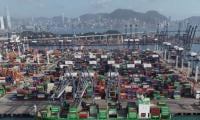CPEC and the new great game
I fear that I may not be doing justice to describing the sentiments of the people of Gilgit-Baltistan and Chitral regarding CPEC. The intensity of these feelings emanate from a sense of being excluded and deprived from CPEC’s development potential – both in a political and economic sense. There is a new wave of a nationalistic upsurge, with the youth gravitating towards sceptical idealism – which ranges from issues of political representation to economic empowerment.
The exaggerated prosperity debate around CPEC is one of the key factors that have generated misgivings among the citizens about the game-changing prospects of this economic juggernaut. The euphoria surrounding CPEC’s transformative role impedes the possibility of a realistic assessment of the long-term impacts of this mega project on culture, the environment and the local economy.
The simulated hype of prosperous future serves the parochial political and economic interests of the ruling elite. The debate over CPEC in the mainstream media has failed to provide an objective and pragmatic strategy for policymakers to help the government engage in a mutually beneficial partnership with China for the optimal utilisation of opportunities.
Such concerns are not restricted to GB alone. Reservations are being expressed frequently in Balochistan, Sindh, KP and various parts of Punjab. At the national level, there seems to be an obsessive-compulsive disorder in the camps of both the proponents and opponents of CPEC. This has triggered conflictual differences and widened the gulf among the various groups in a fragile nation-state.
There is a visible trend of a mission drift in the original script of development promises as recently-revealed deals include the leasing of agricultural land and mining sites to Chinese companies. This has reinforced scepticism about the project and could potentially ruin the endeavours of consensus-building among the varying political interests. In a political ecosystem of trust deficit among the provinces, a weakening federal structure and the absence of a visionary leadership of statecraft, CPEC has become a bone of contention. Each province – vying for a larger share of the pie – is finding it difficult to convince its people to rise above the immediate gains in the larger interest of the country.
At times, CPEC appears to formalise the protracted conflicts between the federating units, which have become all the more pronounced with the rising appeal of ethnocentric nationalism. In a fraying political fabric of a fragile polity, it is advisable for the government and other key stakeholders of CPEC to open the debate for public consumption by being transparent about its pros and cons for the country and its citizens.
CPEC is, of course, a gigantic economic development project. But it is not the panacea to address all our development ills. It must be based on a sense of reciprocity to promote the interests of both China and Pakistan in the strictest sense of the principles of international relations. It is more a matter of gauging the diplomatic depth of a state to strike a deal and achieve optimal gains from such partnerships rather than to judge the intentions of the other party. In our critical discussions about CPEC, we tend to forget the very principle of quid pro quo in international politics, which defines interstate relations in the pursuit of interests that are both a moral and an objective in their nature.
Some critics have gone much further and drawn an analogy between CPEC and the East India Company, calling it part of an imperialistic expansion. In doing so, most of these critics do not provide an in-depth analysis of the inner workings of global capitalism and its political nemesis anchored by the Chinese in the contemporary intra-national politics. Of course, it would be a facile view to jettison CPEC as an imperialistic agenda. But it is vital to locate CPEC in the political context of an emerging international scenario of the Rising South led by China.
Stopping short of the new cold war, experts of international relations see the rise of the South as the beginning of a new Great Game. During this era of the so-called new great game, it is less obvious whether this is likely to annihilate the possibility of a different global order. This raises many questions about the validity of ideological politics when two seemingly diametrically opposed ideologies are in a transactional relationship in economic and political terms.
If the new Great Game involves containing the political influence without compromising the economic interests, it would be difficult to consider China and the West to be two distinct ideological camps that are bitterly hostile towards each other. There is little economic reason to see the beginning of a new cold war when Western capitalists consider China to be one of the most conductive investment place for profit accumulation.
The stark contradiction between the political ideology and the economic mode of production in China will lead to chaos and uncertainties to restrict growth and expansion. Quite contrary to commonly-held view that China will be threatened by the pro-Western movements, there is a strong likelihood that China may see an upsurge of the radical left. This would be a moment of surprise for China and for those who would be quick to call it a yellow revolution, just as they have been good at naming – rather colouring – the revolutionary attempts in the 21st century.
China’s One Belt One Road (OBOR) initiative is, of course, a source of hope for an 800 million-strong workforce, which is going to face huge lay-offs due to the economic downturn in China. Job creation is one of the key strategic objectives of the OBOR initiative in addition to broadening the choices of the relatively secure and cost-efficient trade routes.
State capitalism in China is under tremendous pressure owing to an inefficient labour-intensive structure, which is further plagued by a lack of accountability. The Pakistani political leadership should not pin too much hope on Chinese investments under CPEC because they are primarily designed to help accelerate economic growth to sustain a huge workforce in China. However, Pakistan can strike some profitable deals with a clear-cut inclusive national growth and development programme. The government must take all provinces and federating units into confidence to turn the challenge of nation-building into an opportunity through an equitable investment plan.
The government and the security agencies should be on the same page on the issues of national significance. They should not send out public overtures of inner strains between themselves. The melodrama of CPEC is here to stay and its proponents and antagonists will continue to put forth their arguments for and against the project. The proponents are content with the idea of an envisaged prosperity and their stake in the upcoming economic opportunities. Meanwhile, the antagonists have carved out a discourse of discontent and defiance. The choice is either to play to the gallery or to change the game and tame the ghost. And that is, indeed, a hard choice to make.
The writer is a freelance columnist based in Islamabad.
Email: ahnihal@yahoo.com
-
 ‘Miracle On Ice’ Redux? US Men Chase First Olympic Hockey Gold In 46 Years Against Canada
‘Miracle On Ice’ Redux? US Men Chase First Olympic Hockey Gold In 46 Years Against Canada -
 Friedrich Merz Heads To China For High Stakes Talks In An Effort To Reset Strained Trade Relations
Friedrich Merz Heads To China For High Stakes Talks In An Effort To Reset Strained Trade Relations -
 Astronauts Face Life Threatening Risk On Boeing Starliner, NASA Says
Astronauts Face Life Threatening Risk On Boeing Starliner, NASA Says -
 Hailey Bieber Reveals How Having Ovarian Cysts Is 'never Fun'
Hailey Bieber Reveals How Having Ovarian Cysts Is 'never Fun' -
 Kayla Nicole Looks Back On Travis Kelce Split, Calls It ‘right Person, Wrong Time’
Kayla Nicole Looks Back On Travis Kelce Split, Calls It ‘right Person, Wrong Time’ -
 Prince William And Kate Middleton Extend Support Message After Curling Team Reaches Olympic Gold Final
Prince William And Kate Middleton Extend Support Message After Curling Team Reaches Olympic Gold Final -
 Nvidia CEO Praises Elon Musk, Calls Him An ‘extraordinary Engineer'
Nvidia CEO Praises Elon Musk, Calls Him An ‘extraordinary Engineer' -
 Shia LaBeouf's Mugshot Released After Mardi Gras Arrest On Battery Allegations In New Orleans
Shia LaBeouf's Mugshot Released After Mardi Gras Arrest On Battery Allegations In New Orleans -
 Timothee Chalamet Felt '17 Again' After Reunion With 'Interstellar' Director Christopher Nolan
Timothee Chalamet Felt '17 Again' After Reunion With 'Interstellar' Director Christopher Nolan -
 Conan O'Brien Speaks First Time After Rob Reiner's Killing
Conan O'Brien Speaks First Time After Rob Reiner's Killing -
 Giant Tortoise Reintroduced To Island After Almost 200 Years
Giant Tortoise Reintroduced To Island After Almost 200 Years -
 Eric Dane Drops Raw Confession For Rebecca Gayheart In Final Interview
Eric Dane Drops Raw Confession For Rebecca Gayheart In Final Interview -
 Trump Announces New 10% Global Tariff After Supreme Court Setback
Trump Announces New 10% Global Tariff After Supreme Court Setback -
 Influencer Dies Days After Plastic Surgery: Are Cosmetic Procedures Really Safe?
Influencer Dies Days After Plastic Surgery: Are Cosmetic Procedures Really Safe? -
 Eric Dane Confesses Heartbreaking Regret About Daughters' Weddings Before Death
Eric Dane Confesses Heartbreaking Regret About Daughters' Weddings Before Death -
 Nicole 'Snooki' Polizzi Reveals Stage 1 Cervical Cancer Diagnosis
Nicole 'Snooki' Polizzi Reveals Stage 1 Cervical Cancer Diagnosis



